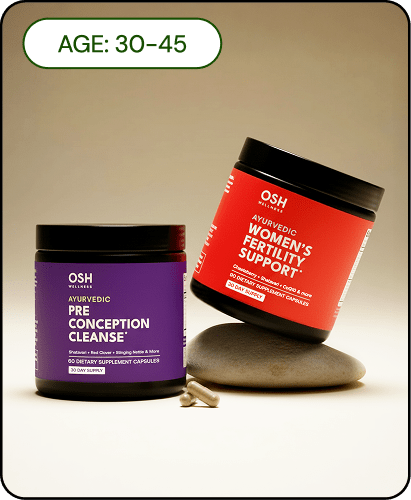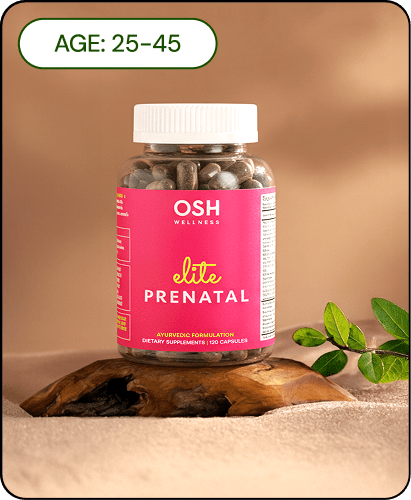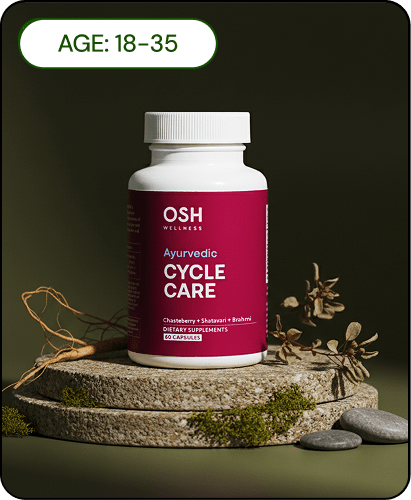You likely know the average period cycle length. Most resources and products will often refer to this 28-day cycle, making it seem normal for everyone. However, many individuals don’t have 28-day cycles. Your period may occur every 30 days or sometimes even longer. And for a few individuals, their period length can vary, leaving them feeling far from the “regular” 28-day cycle.
If your cycle isn’t just a bit longer or shorter than 28 days but seems to come and go whenever it pleases, you may have irregular periods. Some variability in your period length or frequency often isn’t a cause for concern. On the other hand, irregular periods can signal that something is out of balance with your body and usually necessitate further investigation. Here are the basics of period irregularities you should know.
What are irregular periods?
Irregular periods are defined as varying menstrual cycle lengths from month to month. Most periods are 5-7 days long, but your menstrual cycle includes the days of your period and the gap between periods. It spans from the first day of your period to the start of your next period. If this gap keeps changing, you may have irregular periods.
Before puberty and closer to menopause, it is common for this gap to vary in length. But after puberty, through their fertile years, most women will develop a regular period pattern, only varying by a few days. If your period lasts 15 days one cycle and 30 days the next, this could indicate irregular periods. Here are a few other signs to look for.
How can you tell if you have irregular periods?
The primary symptom of irregular periods is varying cycle lengths. How can you tell if your period is irregular?
Tracking is a great place to start. The first day of your period is generally considered your first day of actual flow, not spotting. Mark this day and then track to the first day of your next period. The number of days in between is your menstrual cycle length. Continue to track for a few more cycles. Irregular periods don’t have to vary widely. Still, they can be as changing as a 21-day cycle followed by a 30-day cycle and then a 25-day cycle.
The American College of Obstetricians and Gynecologists (ACOG) states a normal menstrual cycle length can be between 21 and 35 days. It is considered irregular if your period comes less often than 35 days or more frequently than 21 days. ACOG also considers a period between 21 and 35 days that varies from cycle to cycle by 7 to 9 days irregularly.
Cycle tracking is important when figuring out if you have irregular periods. Most other symptoms associated with period irregularity are usually tied to an underlying condition, like PCOS, of which irregular periods can also be a symptom. These symptoms can also signal that something is out of balance with your body. Common symptoms you may experience with irregular periods include:
Light or very little bleeding
If you bleed very little, or sometimes not at all (amenorrhea), it may be linked to the same cause as your irregular periods, such as being underweight or overweight.
Excessive or extended bleeding
Excessive bleeding (menorrhagia) or bleeding for more than seven days isn’t usually considered normal. ACOG considers bleeding through a single pad or tampon every hour for several hours or experiencing clots the size of a quarter or bigger to be excessive bleeding.
Spotting between cycles
Lightly bleeding or spotting in between true menstrual cycles is another common symptom experienced by those with irregular periods. Usually, it is tied to your hormones.
Very painful cramps
Dysmenorrhea, or very painful cramps, shouldn’t be the norm with your periods and could signal an underlying condition like fibroids.

What causes irregular periods?
Irregular period causes can range from underlying health conditions to stress.
Illness, a traumatic event, or stress at work or home can disrupt hormone production, leading to irregular periods. However, stress won’t usually cause your periods to be irregular continually from month to month. A trip to a new time zone that affects your sleep patterns can cause cycle irregularity too. But again, if your period goes back to the normal length the next time you menstruate, there likely isn’t cause for concern.
Other factors that cause an unalarming period include pregnancy and breastfeeding. Menopause or perimenopause causes the cycle length to vary, too. These conditions are known to make periods irregular and typically don’t cause doctors to worry.
If you drastically increase your activity level, such as training for a marathon, you could also find that your cycle length varies. Variation is most seen if you experience rapid weight loss. While experts know that this happens, it can still be problematic, especially if you are trying to conceive or hope to start trying soon.
Finally, underlying conditions can cause irregular periods. Generally, these conditions are associated with your hormones and reproductive organs, such as PCOS or endometriosis. They can be a cause for concern and should be evaluated by your doctor.

When should you see a doctor?
Even if you don’t religiously track your menstrual cycle, you likely know your cycle patterns. You can tell when your period is atypical. An irregular period for one to two cycles and then goes back to normal often isn’t a reason to stress. However, if your period irregularity persists or you are experiencing other symptoms, it’s wise to consult your doctor.
Can irregular periods be prevented?
Because irregular periods can have several causes, they can’t always be prevented. However, taking care of your body and hormones is one way to help lessen the chances of having an irregular cycle.
How can I lower my risk of having an irregular period?
Paying attention to your diet and weight is beneficial. Include healthy foods like fruits, vegetables, protein, grains, healthy fats, and oils. Cutting out over-processed foods and refined sugars that may affect hormone production can also help. You may need to gain or lose weight as your doctor advises.
Sleep and stress are linked to hormone production as well. Avoid stressing your body with irregular sleep cycles, and get adequate rest. You may find that calming practices and relaxation techniques help lower stress levels. Moderate, regular exercise is important for health. Still, you may want to cut back if you have a frequent and intense exercise regimen.
Check-ups with your gynaecologist are important to rule out health issues that can contribute to irregular menstrual cycles. If you take hormonal birth control, do so only as prescribed, as missing or skipping doses can cause irregular periods.
Finally, you may want to consider a supplement. Certain nutrients are necessary for hormone production, and with a modern lifestyle, a regular diet may not be enough to meet your nutrient needs, and a supplement may be able to help. Osh Wellness Cycle Care, and Hormone & Mood Support are each carefully crafted with Ayurvedic botanicals traditionally used to balance hormones and promote womb.
Irregular Periods, a Cause for Concern?
If your period is 25 days one cycle and 30 the next, then goes back to its typical 28-day schedule, there is likely no reason to worry. But if you can’t predict when your period is coming from one month to the next, it could be irregular periods.
Furthermore, your cycle irregularity could signal that something is off with your body. Always check with your doctor if you’re concerned about period issues. Irregular periods aren’t always a cause for concern, but cycle variability can be annoying nonetheless! Following the irregular period prevention tips above can help promote hormonal balance and cycle regularity for happy and healthy periods.







